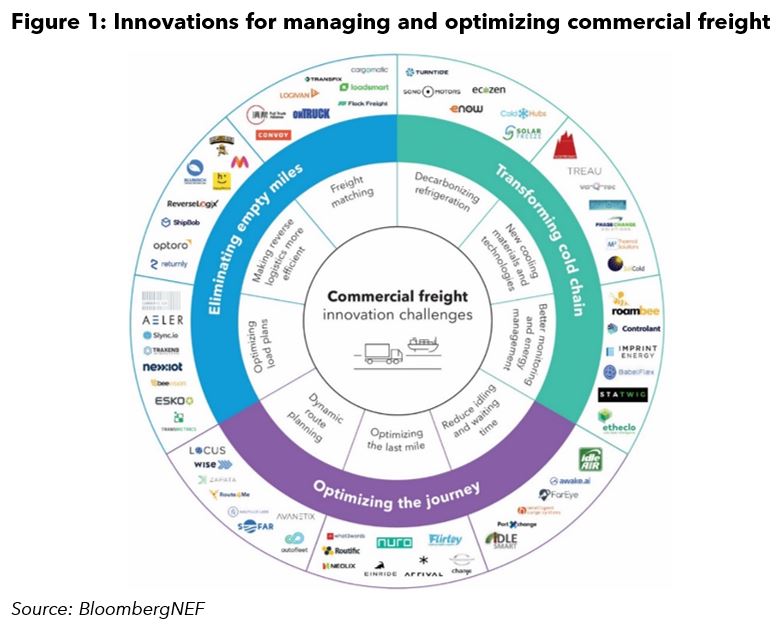ARTICLE
Startup Innovations To Tackle Freight Decarbonization: BNEF Climate Technology White Papers
There is an urgent need to scale new climate technology innovations that can deliver equitable, economic and timely decarbonization. This week, BloombergNEF released three white papers – here – that analyze technology innovations and the early-stage companies developing them. These technologies could play an important role in addressing climate challenges.
These publications are part of BNEF’s climate-tech and innovation coverage, tied to our annual Pioneers competition. The Pioneers program identifies a group of game-changing technologies or innovations with the potential to accelerate global decarbonization and address climate change. In 2021, the Pioneers competition focused on recognizing innovators across three key challenges (see this year’s winners here). The BNEF white papers cover these challenges:
- Managing and optimizing commercial freight
- Advancing sustainable materials
- Monitoring and understanding our changing planet
The first paper, profiled in this article, focuses on the complexities of near-term decarbonization of the commercial freight sector in the near term, while it continues to rely on fossil fuels for power. Stay tuned for upcoming articles on the other two papers.
Managing and optimizing commercial freight
The transport industry is moving toward drivetrain electrification and clean fuels, yet decarbonization is occurring slowest for commercial freight. There are a variety of inefficiencies in the commercial transport sector that, if tackled, would help accelerate freight decarbonization. In this white paper, we analyze technology innovations, profile 65 early-stage companies and provide data on the $9.5 billion of venture capital money that has flowed into these technologies since 2018.

Eliminating empty miles:
Some 20-40% of road carrier distances are completed with no load, while up to one-third of marine freight travels empty. Some 24% of e-commerce parcel space is empty, and up to 40% of online orders are returned, creating complex and inefficient logistics. This paper reviews how freight-matching, optimizing load plans and digital returns management and analytics can eliminate empty miles and avoid unnecessary carbon emissions.
Optimizing the journey:
More than 70% of local delivery businesses in the U.S. still plan routes manually, yet a road journey with only 15 stops can have more than 87 billion round-trip routes. Meanwhile, ships that employ dynamic routing can improve trip forecast accuracy by 50%, compared to manual planning. Idling time accounts for about 25% of a vehicle’s operational time. This paper reviews how dynamic route planning can support more efficient journeys, how to best optimize the last mile, and the technologies to use to reduce idling and waiting time.
Transforming cold chain:
Refrigerating perishable goods accounts for 3.5% of global greenhouse gas emissions. A refrigeration unit can consume up to 20% of a vehicle’s diesel. However, cold-chain management is key to avoid otherwise substantial losses. We estimate post-harvest losses of farm produce in India, where there is limited cold chain, to be as much as $14 billion annually. This paper reviews new materials to replace harmful refrigerants, greener ways of powering refrigeration and methods to better monitor and protect perishable goods.





